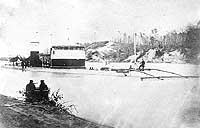
USS Saugus, a 2100-ton Canonicus class monitor, was built at Wilmington, Delaware. Commissioned in April 1864, she served in the North Atlantic Blockading Squadron during the Civil War's final year, primarily in the James River region. The ship engaged Confederate batteries and ironclads in Trent's Reach, on the James, on 21 June 1864 and fired on the enemy on other occasions during the next several months. In late December, she went to sea to participate in the abortive attempt to capture Fort Fisher, on the North Carolina coast. A few weeks later, Saugus returned for the bombardment and amphibious operation that took that vital strong point on 15 January 1865, thus closing the port of Wilmington to blockade runners. After a few months' further duty on the James, she went to the Washington Navy Yard, D.C., in early April and was temporarily used there as a prison for suspected conspirators in the murder of President Abraham Lincoln.
Saugus was out of commission at the Washington Navy Yard between June 1865 and April 1869. She then served along the Florida coast and at Key West until the end of 1870. In June 1869, she was briefly renamed Centaur, but regained her original name in August. Saugus was again in commission for duty along the Atlantic and Gulf coasts during most of the 1872-77 period. She was sold in May 1891.
This page features, or provides links to, all the views we have related to USS Saugus.
For more views related to USS Saugus, see:
| If you want higher resolution reproductions than the digital images presented here, see: "How to Obtain Photographic Reproductions." |
Click on the small photograph to prompt a larger view of the same image.
Note: In addition to the views presented above and on the next page, Photo # NH 44267 was originally identified in our files as USS Saugus. However, this view clearly does not show her, as the ship seen there is of a different class of monitor than she.
For more views related to USS Saugus, see:
| If you want higher resolution reproductions than the digital images presented here, see: "How to Obtain Photographic Reproductions." |
Page made 11 November 2001